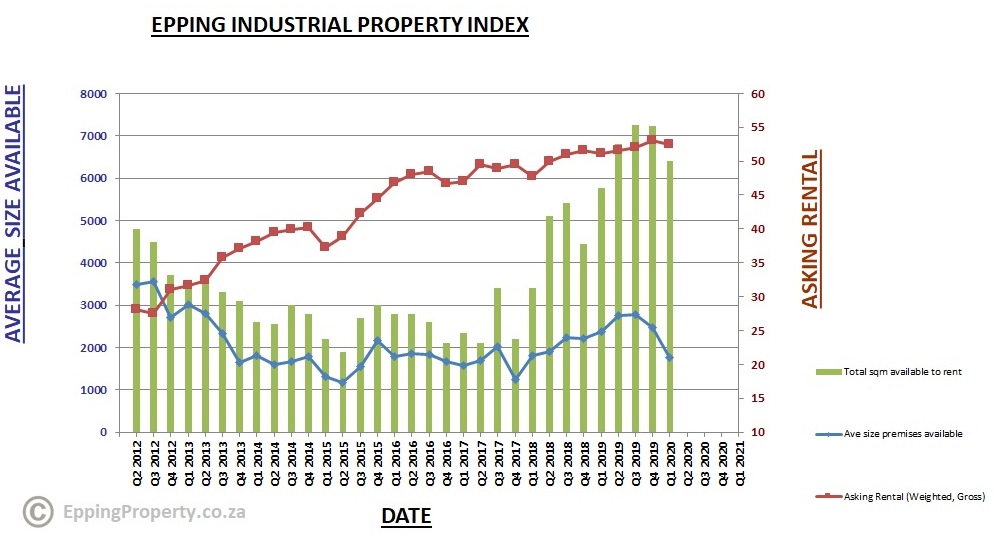
The COVID-19 hurricane has engulfed the world, and all businesses are entwined in a whirlwind of uncertainty. In South Africa, with the lockdown of shopping malls, much discussion has revolved around the major retailers and the listed property funds. There has, however, been minimal commentary on how the lockdown affected industrial-based businesses and industrial property owners. And what the future may hold?
Tony Bales of Epping Property says that even before the coronavirus, the industrial property sector had been enduring tough economic times. “Vacancy levels were at record highs (in the last seven years), rental growth was slowing and new industrial developments and business confidence were at record lows.”
The latest Epping Industrial Property Index (below) for the quarter ending 31 March 2020 depicts this situation.

Now, enter 2020 and more recently, industrial property and COVID-19. The larger food-related and pharmaceutical businesses have generally continued to maintain a form of financial continuity, however the vast majority of industrial enterprises have not been as lucky.
Epping Property advises that many industrial businesses in South Africa
felt the pinch as far back as January when the supply of goods from China significantly dried up.
Companies that relied on important components simply had their manufacturing or supply chains grind to a halt. The lockdown in South Africa has further hampered local companies as China appears to be getting back to business.
Industrial Property and Covid-19 – Where we are now?
“The majority of industrial businesses form part of a larger supply chain. For example, clothing (if manufactured locally) has to be packaged – packaging company in lockdown, packaging has to be printed – printing company in lockdown, suppliers of printing inks and finishes – in lockdown, the finished product has to be transported – transporters and couriers in lockdown, the product has to be warehoused – warehouses in lockdown.”

As can be seen – for every product, there is also an extensive supply chain that most people don’t think about.
“Furthermore,” says Epping Property, “the nature of businesses in South Africa is one where many processes are labour intensive. Many industrial companies in lockdown have a very high labour-to-sales ratio, translating to labour being a very significant monthly cost item. Much of the industrial workforce are “blue-collar” workers who financially survive on a week-by-week basis. With no income coming in due to the COVID-19 pandemic
businesses will very quickly find themselves in financial trouble. Any suspension of salaries will be disastrous to their employees and the family members that many of them support.”
The Reality
Epping Property continues that with industrial businesses taking strain during the COCID-19 pandemic
, many of them will find it difficult to pay their landlords their rentals. “The JSE listed property landlords have their backs to the wall as they have bank loans they need to service. Also, they have investors they’ve promised a rental return. In a nutshell, most landlords have loans on their properties which require monthly repayments and many private landlords also rely on monthly rental income to live on.”
According to Quintin Rossi, CEO of Spear Reit Limited, there will not be any sector or sub-sector within the real estate space that will come out of the crisis unscathed. “There is no doubt that we will as a sector start to see rising bad debt’s and tenant failures as economic conditions deteriorate and the effects of COVID-19 spread across South Africa. Landlords need to do their owner assessment of risk on a tenant by tenant basis but as the economy continues to deteriorate no Landlord can afford to lose a good tenant.”
So, we have ended up in the perfect storm with industrial businesses with their backs to the wall. Also, landlords trying to service commitments to banks and investors. Everyone is in a sticky situation. Where to from here?
The Solutions
The solutions, according to Epping Property, can only lie with industrial businesses communicating and being open and honest with their landlords and bankers. Landlords, in turn, must be open and honest with their bankers and investors. “In the medium-term, businesses need premises (with leases) to operate out of, and landlords need tenants. Everyone needs bankers. We are all in this together. Solutions need to be sought that satisfy both the short-term requirements of both parties and also look towards the medium-term.”
“With Industrial Property and COVID-19, the whole industrial property sector is currently in turmoil. Certain businesses will not survive. Most businesses will feel a large amount of disruption and financial pain. Jobs will be lost. Industrial landlords will collect less rental income. Short-term, industrial property vacancies will increase and industrial rentals will fall.”
“The world, as we knew it has changed. As a result, industrial businesses, industrial landlords and the banks will all need to find short-term solutions that can be accommodated by all parties. All parties need to survive and co-exist in the longer-term,” concludes Epping Property.
